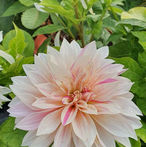The blooms for two specials
The bft collection
Amaryllis, Dahlias, Hellebores, Peonies, and Roses make up the main blooms for two collection and it is not just because of their beautiful flowers. Almost each one of these, with the exception of the Dahlias, commemorate a meaningful event or a memory - the good, the bad, the happy and the sad.
It is for certain that this collection will only continue to grow over time.
A little bit about these plants
Typically flowers in winter with blooms lasting over a week. Their big, beautiful blooms make up for their lack of scent.
Placing your Amaryllis in a warmer area makes it grow quicker, and on the other hand, a cool spot makes it grow slower.
If you are new to growing Amaryllis, I recommend this video from Danielle from Northlawn Flower Farm which provides tips on growing, propagating, and reblooming Amaryllis.
At their peak in summer, Dahlias come in different shapes and sizes - cactus, semi-cactus, collarette, decorative, dinnerplate, pompon, singles, anemone, and waterlily.
They are wonderful cutflowers, and with the right care and maintenance, can also do well as potted plants. Pests include slugs, snails, and thrips, and look out for dahlia diseases such as crown gall or leafy gall.
These are one of the very few flowers that you will see flourishing in the winter so it is a good addition as it adds some color to the garden during a time where most plants are dormant.
They are low maintenance and will keep coming back every year.
Herbaceous, Tree, or ITOH (intersectional) are the three types of peonies.
Herbaceous peonies die back in fall/winter and produce new stems in spring. Tree peonies on the other hand, don't die back to the ground and have woody stems.
Intersectional peonies are a cross between herbaceous and tree peonies and also die back to the ground. These type of peonies are usually in the higher price range compared to a herbaceous or tree peony
It is common to find ants on peony buds as they are attracted to the nectar secreted by the bud but these won't harm the peony at all.
They come in different types, shapes, colors, and sizes. Some of the common rose types include Shrub, Hybrid Tea, and Climbing/Rambling roses.
They can be bought as bare roots, which is how most of the roses in the blooms for two collection were acquired, or as potted and matured plants.
Black spot is a common rose disease where, literally, black spots are visible on the leaves. Removing the affected leaves is advised to prevent it from spreading.
All information provided on this website are based on personal experience, growing zone, and in-house tests conducted. Experience and results may vary depending on one's location and growing conditions.
If you have any questions or feedback regarding any of the contents of this website, please do not hesitate to send a message here.




























































